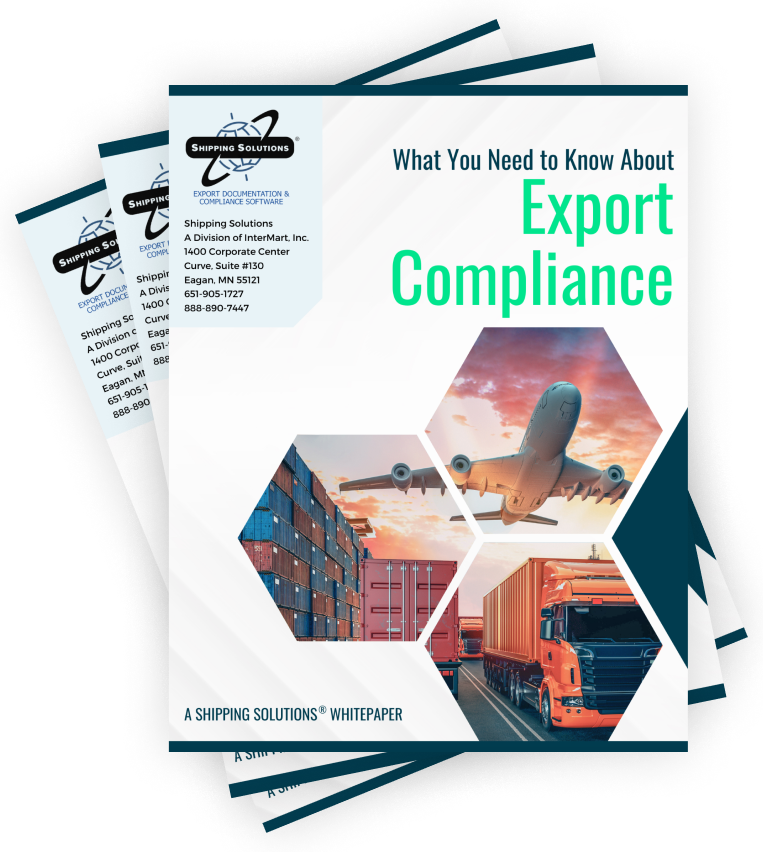The International Trade Blog Export Compliance
A Summary of Government Agencies That Regulate U.S. Exports
On: January 18, 2023 | By:  David Noah |
5 min. read
David Noah |
5 min. read
 It may seem easy to become an exporter—particularly since the internet knows no borders—but the scope of things exporters need to be aware of is very broad.
It may seem easy to become an exporter—particularly since the internet knows no borders—but the scope of things exporters need to be aware of is very broad.
To start with, companies need to identify foreign markets for their products, determine the best method for selling those goods and make sure they're going to get paid.
They also need to be aware of potential export compliance issues. And to do that, they need to know which U.S. government agency has jurisdiction over their goods and what set of export regulations apply. Without enough information, it can quickly get confusing.
To give you an idea, here’s a list of different government agencies that have published regulations that control U.S. exports.
Key Agencies Involved with Exporting
There are three U.S. government agencies that control the majority of exports: the Department of Commerce, the State Department and the Treasury Department.
Department of Commerce—Bureau of Industry and Security (BIS)
The BIS is the agency within the Department of Commerce with jurisdiction over most goods exported from the United States. It oversees several crucial aspects of export compliance, including implementing and enforcing the Export Administration Regulations (EAR). The Commerce Control List (CCL) within the EAR lists the products that are subject to the regulations.
Other relevant divisions and agencies within the Department of Commerce include:
- U.S. Census Bureau, whose export-related tasks are controlled by the Foreign Trade Regulations (FTR). Many of these regulations relate to export data collection—referred to as Electronic Export Information (EEI)—through the Automated Export System (AES).
- The International Trade Administration promotes exports through a global network of Commercial Service offices and export assistance programs such as its Gold Key Service. In addition, it enforces trade laws and agreements that ensure U.S. companies avoid foreign government-imposed trade barriers.
State Department—Directorate of Defense Trade Controls (DDTC)
The DDTC ensures that commercial exports of defense articles and defense services are consistent with U.S. national security and foreign policy objectives.
The DDTC is responsible for enforcing the International Traffic in Arms Regulations (ITAR). It also regulates the export of defense articles under the Arms Export Control Act, which is found in the ITAR.
Department of the Treasury—Office of Foreign Assets Control (OFAC)
The OFAC is a branch of the U.S. Department of the Treasury that “administers and enforces economic and trade sanctions based on U.S. foreign policy and national security goals against targeted foreign countries and regimes, terrorists, international narcotics traffickers, those engaged in activities related to the proliferation of weapons of mass destruction, and other threats to the national security, foreign policy or economy of the United States.”
Many of the U.S. sanctions being levied against organizations and individuals located within Russia and Belarus in response to the Russian invasion of Ukraine are being administered by OFAC. It's important exporters screen their exports against the various restricted party lists using comprehensive screening tools like the Shipping Solutions Restricted Party Screening Software.
Other Agencies Involved with Exporting
Additionally, there are several other agencies and branches involved in exports and export control. They are distinct branches, but they are related and work together to protect the interests of the United States.
Securities and Exchange Commission (SEC)
The SEC and the Department of Justice are jointly responsible for enforcing the Foreign Corrupt Practices Act (FCPA), which prohibits the payment of bribes to foreign officials to assist in obtaining or retaining business. The FCPA can apply to prohibited conduct anywhere in the world and extends to publicly traded companies and their officers, directors, employees, stockholders and agents. The SEC's Enforcement Division has created a specialized unit to further enhance its enforcement of the FCPA.
Department of Justice (DOJ)
In addition to enforcing the FCPA, the DOJ also monitors and enforces Restricted Parties Lists for specially designated nationals, including banks. The FBI is a branch of the DOJ that enforces export controls, including counterproliferation and rules put forth by OFAC and the Drug Enforcement Agency (DEA).
Department of Agriculture (USDA)
The USDA is involved in exporting via agencies like the Animal Plant Health Inspection Service (APHIS), which, among other things, certifies that wood pallets and packaging coming into the U.S. are bug-free. Similarly, the USDA’s Food Safety and Inspections Services department ensures there is no infestation of food brought into the U.S.
Department of Homeland Security—Customs and Border Protection (CBP)
The CBP’s mission is to “safeguard America's borders thereby protecting the public from dangerous people and materials while enhancing the Nation's global economic competitiveness by enabling legitimate trade and travel.”
The U.S. Coast Guard also plays a role in exporting by securing the ports and waterways of the U.S. and by providing the nation's first line of defense against drug smugglers seeking to bring illegal substances into the United States.
Department of Energy
The National Nuclear Security Administration (NNSA) within the Energy Department controls exports related to advancing nuclear nonproliferation in addition to ensuring the integrity and safety of the nation’s nuclear weapons.
Department of the Interior—U.S. Fish and Wildlife Service
The U.S. Fish and Wildlife Service’s Office of Law Enforcement oversees and enforces the import and export of wildlife or wildlife products, including:
- Businesses and individuals engaged in commerce
- Animal dealers, animal brokers, pet dealers or pet or laboratory suppliers
- Trade show participants displaying wildlife products
- Collectors or hobbyists involved in commercial activities
- Commercial laboratories, researchers or biomedical suppliers
- Circuses and animal shows
- Scientific institutions
- Academic institutions
U.S. Postal Service (USPS)
The Postal Service helps control exporting through the mail system. These controls apply even to individuals and sole proprietors who sell goods through platforms like eBay.
In Conclusion
As you can see, there’s not just a single agency or department that regulates U.S. exports. Exporters need to be aware of the various regulations and how they impact their business. Fortunately, Shipping Solutions export software can help manage the export documentation and compliance requirements. Let us show you how it works.
While I've attempted to provide a broad list of agencies that regulate U.S. exports, I may have missed some. Leave a comment below if you have any suggestions for this list!
Like what you read? Subscribe today to the International Trade Blog to get the latest news and tips for exporters and importers delivered to your inbox.
This article was first published in January 2017 and has been updated to include current information, links and formatting.

About the Author: David Noah
As president of Shipping Solutions, I've helped thousands of exporters more efficiently create accurate export documents and stay compliant with import-export regulations. Our Shipping Solutions software eliminates redundant data entry, which allows you to create your export paperwork up to five-times faster than using templates and reduces the chances of making the types of errors that could slow down your shipments and make it more difficult to get paid. I frequently write and speak on export documentation, regulations and compliance issues.



